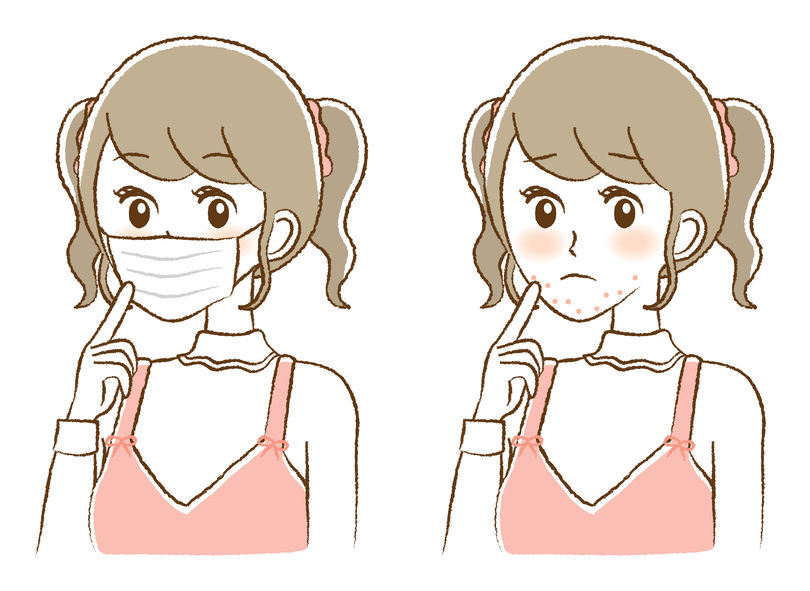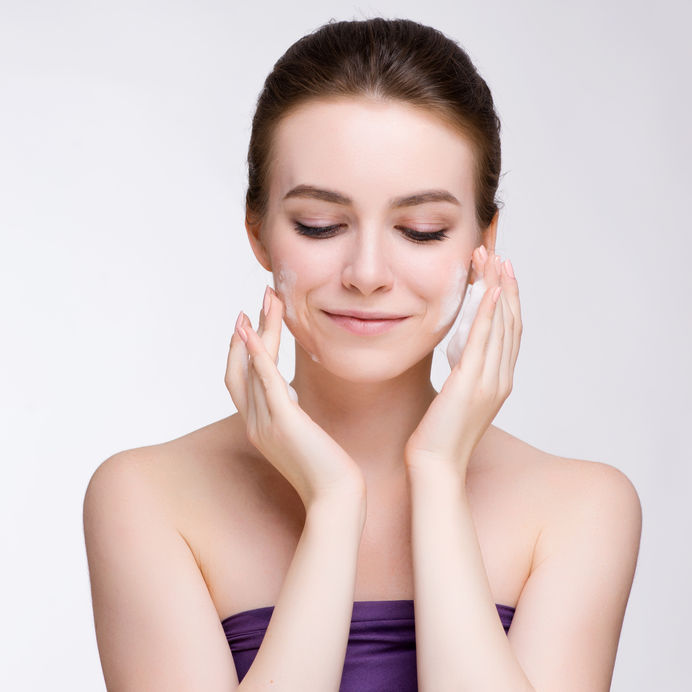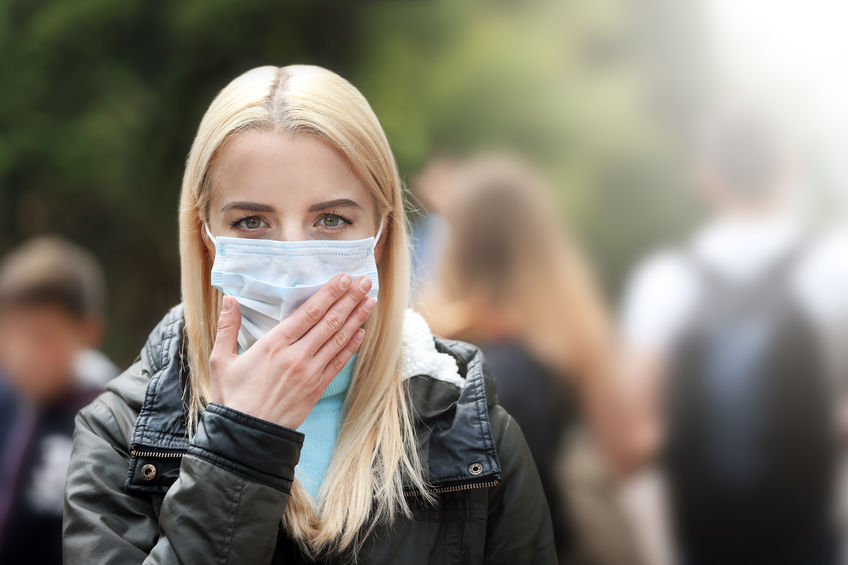Face masks have become a mandatory necessity to fight the spread of the SARS-COV-2 virus that is currently causing pandemonium in our communities. Wearing a face mask is by no means comfortable, and yes, it may clash with some outfits, but it is the only weapon we have at our disposal to keep ourselves and our loved ones safe. As a responsible member of society who wears a fabric face mask, you may have noticed that your skin has started to break out under the protective layers of fabric. As if this pandemic isn’t stressful enough, now you also have to deal with your skin breaking out too!
Tiny little pimples may be rearing their ugly heads along your jawline, on your cheeks, or around your lips. Unfortunately, the downsides of wearing a mask are that your skin may get a little clogged up and irritated, especially if you wear it for long periods of time. But before you panic or decide to throw away your protective mask for good, keep in mind that this is a common problem many face mask users are dealing with at the moment and there are a few solutions to prevent ‘maskne’ or mask acne from popping up in the future.
Why Do Masks Cause Acne?

If you have been following the journey of most essential workers you are probably familiar with the pictures doing the rounds on social media of brave healthcare workers showing their tired eyes as well as their inflamed lesions and bruises on their noses and cheeks. This is due to the friction and pressure of the surgical mask sitting in one spot for long periods of time and is the same reason us mere mortals experience breakouts when wearing our fabric face masks.
Most athletes who wear helmets with chin guards also experience breakouts due to the friction of the fabric, which is commonly referred to as acne mechanica. It is very similar to rug burn. As the day goes on, the tight fabric digs deeper and deeper into the skin, which can become extremely raw and painful.
Another reason why your mask may be causing pimples or cysts to arise is because of the tiny bacteria that start to multiply in between the material fibers and eventually infect the tiny hair follicles on the face. Unfortunately, the environment behind the masks is the perfect breeding ground for pathogens that thrive in humid and warm conditions.
If you normally have sensitive skin, the detergent or fabric softener you are using to wash your mask may also be the culprit. Even if you have rinsed the mask out well, tiny particles of detergent still get trapped in between the fibers of the mask and when it is in direct contact with the delicate skin on your face it may cause dryness, irritation, and inflammation. If you already suffer from skin disorders like psoriasis or rosacea, the excessive rubbing and microparticles of detergent can cause it to flare up again.
How To Soothe Mask Acne?
Eat The Right Nutrients
Addressing the problem on the inside is just as important as addressing it on the surface. Acne can be triggered by external factors such as friction, poor hygiene, and trapped bacteria, but it can also arise due to poor diet and nutrition.
Carbohydrate-rich foods and sugar are known to trigger acne breakouts due to the influence it has on certain hormones. Eating foods that contain acne-fighting ingredients such as Zinc, Omega 3, and Vitamin A can help reduce the severity and frequency of the outbreaks.
In addition to taking a second look at your diet, investing in a reputable supplement that is designed to combat acne can also help keep outbreaks under control. A nutritional supplement like AcneTru™ contains the right amount of vitamins and clinically proven ingredients like Niacinamide and Pantothenic Acid that help to control the amount of oil secreted by the sebaceous glands and encourages skin cell repair.
Always Opt for Cotton
Since medical-grade masks should strictly be reserved for essential workers on the frontline, the rest of the public has been advised by the CDC to wear masks made of cloth. But you can’t just pick and choose the first material you see, especially if you have sensitive skin. Some materials also don’t offer maximum protection, which could leave you more exposed to contracting the virus in crowded public spaces.
Whether you are shopping for a mask or planning on making one yourself at home, the best material to look for is 100% cotton. Tightly woven cotton is not only breathable but also not as abrasive as other materials on the skin. It is also lightweight, easy to clean and care for, and also acts as a sturdy barrier against foreign invaders lurking in the air. According to studies, tight-fitting cotton masks provide a mechanical barrier against most aerosol particles.
Keep Your Mask Clean
Spraying your mask with sanitizer or leaving out in the hot sun for a few hours before reusing it is not doing your skin any favors. Think of all the sweat and bacteria that start to accumulate under the mask even after an hour. Not to mention all the dead skin cells that may also get trapped in the material fibers.
In order to prevent acne-causing bacteria from clogging up your pores, your mask should be washed with hypoallergenic laundry detergent in hot water after every use. If you use a mask every day, buy a few extras so that you can rotate them throughout the week.
Give Your Skin Extra TLC

Due to the pandemic, financial pressure, and uncertainty about the future, we are all under a lot more stress than usual. Stress is a leading factor behind acne breakouts, which is why we need to give our skin a little extra TLC by turning our skin routine up a few notches.
If your skin is inflamed, invest in a gentle fragrance-free cleanser that will help remove any dirt or bacteria trapped inside the hair follicles and pores. When washing your face, be sure not to scrub or use any other abrasive agents like exfoliators or cleansing brushes as this will only make the problem worse. Instead, gently rub the cleanser into the skin using circular motions and rinse with lukewarm water.
Investing in a good lightweight moisturizer will also help alleviate some friction your fabric mask may be causing. Look for formulas that contain soothing ingredients such as aloe vera and ceramide. It is also important to choose a lightweight formula as thicker butters may clog the pores and aggravate the skin even further.
Now that your skin is clean and moisturized, it is only natural to want to apply some foundation and concealer to cover up some spots and blemishes especially if you are going out. Unfortunately, foundation does not form part of an acne-fighting skin regime when wearing a mask. Your skin is already suffocating under a layer of fabric and using foundation or other comedogenic ingredients will only worsen the breakout. Additionally, foundation has a nasty habit of rubbing off and clinging to fabric fibers, which can eventually turn your mask into a Disneyland for bacteria.
The Bottom Line
At the moment there is no way around the fabric face mask laws and simply not wearing one is not the solution right now. Instead, shopping for the right fabrics, upping your skincare regime, and taking a tried and tested acne supplement like AcneTru™ by Approved Science is the best way to keep your skin happy and yourself protected during this world crisis.

